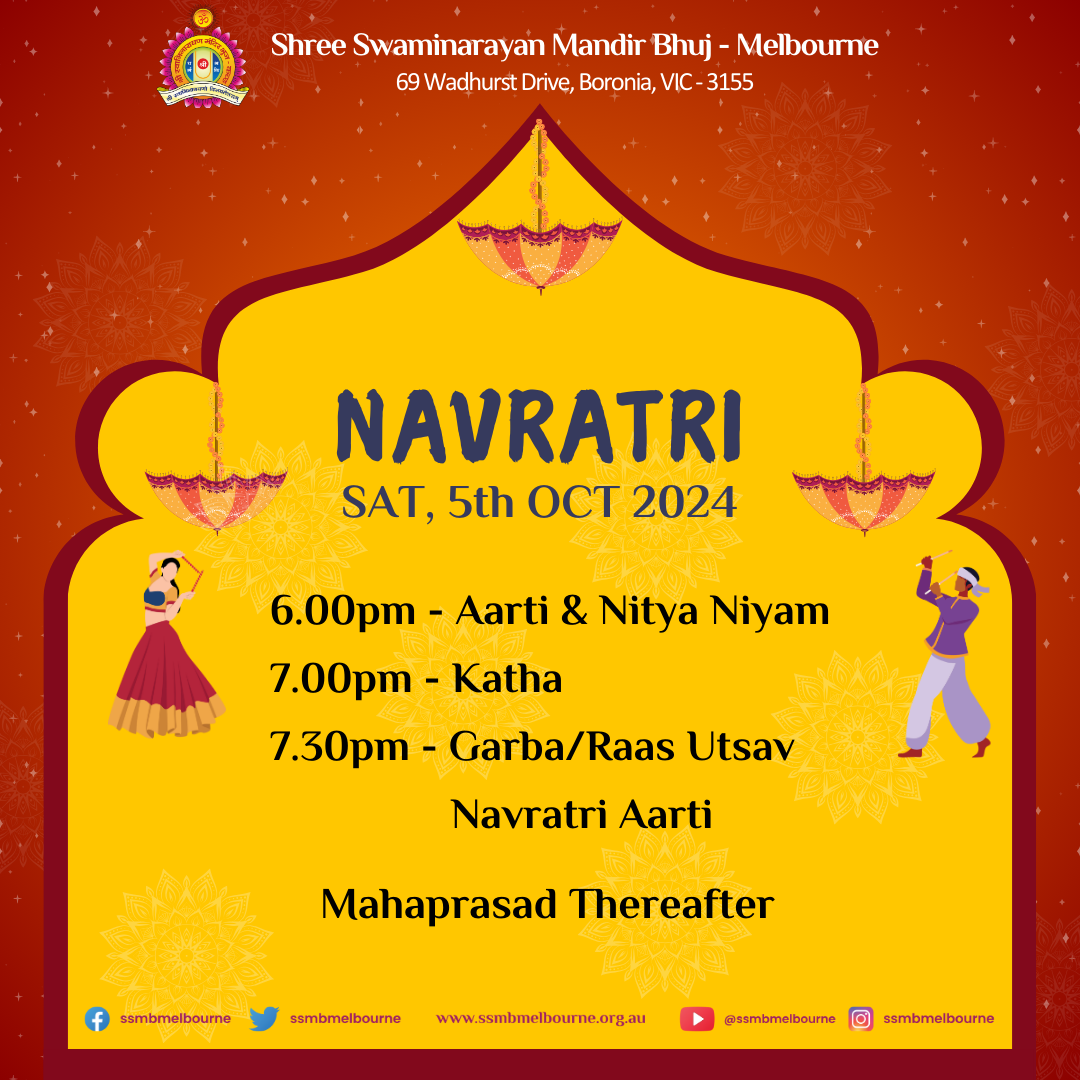In Shikshaparti Slokha 84, Lord Swaminarayan mentions, ‘My followers shall regard the five deities named here with reverence – Vishnu, Shiva, Ganpati, Parvati and the Sun.’
Navratri is celebrated between Aaso Sud 1 and Aaso Sud 10 i.e. for 9 days which are meant for the worship of Goddess Parvati. Tired from the harassment from Demon Mahishasoor, the Devtas requested Bhrahma, Vishnu and Shivji (Tridevs) to help them. Shaktimaa appeared from the Tridevs anger and fought with the demon continuously for 9 days. The demon was killed which signified the victory of Divine over the Evil and therefore we celebrate these 9 days by singing Mataji’s devotional songs with musical instruments.
The episodes associated with this festivals can be found in various Religious texts like Markandeya Purana, Vamana Purana, Varaha Purana, Shiva Purana, Skanda Purana, Devi Bhagavatam and Kalika Purana.
In the Second Canto and Sixteenth Chapter of Shreemad Satsangi Jeevan, Lord Swaminarayan elaborates on the ethics of Navratri. (Satsangi Jeevan Prakran 2 Adhyaay 16)
Suvrat Muni said, “O King! Prince Vaghji’s devotion unto Lord Hari became firmer after listening to Him. He humbly asked Shree Hari with folded hands in reverance, ‘The austerity of Navratri in honour of Goddess Parvati commences from tomorrow. We have celebrated it for many generations. The sacrifice of innocent animals and consumption of alcohol do take place sometimes at some places. O Lord! Please advise us whether we should observe this austerity. You are promoter of Sanatan Vedic Dharma and we are your disciples hence we will follow your guidance faithfully.”
“Lord Shree Narayanmuni said, ‘Oh Prince! Only Rajasi and Tamasi Deities may consume meat and alcohol. The Satvic deities never consume alcohol or meat. Goddesses Parvati, Laxmi and Savitri are Satvik and virtuous with Dharma, knowledge, austerity, Yoga and Vairagya. Parvati, the wife of Shiva, is reverential to all of us and this Vrat is hers. You may venerate Parvati and other Satvik deities without any hesitation but never any of the Rajasi or Tamasi deities.
Goddess Parvati does not condone animal sacrifice and whoever still does it misguidedly are demonic persons. The practice of animal sacrifice or offering alcohol in food offering during veneration of Goddess Parvati during the austerity of Navratri, however ingrained by the age old practice, is wholly unethical. If any sect permits or condones this form of practice, rest assured, it is against the religious codes of conduct and such practice must be shunned. Indeed, to leave and discard such sect is supported by the pious Scriptures.
You are My disciples and understand the true meaning of Dharma. You must never venerate any deity where alcohol or meat is offered as a offering of food. Violence is liked by demonic persons, while religious people always like non violence. We, devotees of Lord Krishna, must never be afraid of such inconsequential deities as He is the regulator of Kaal and Maya while such inconsequential deities are subordinate to Kaal and Maya. My devotees must neither debate with nor criticise any such inconsequential deities or their followers.”
Suvrat Muni said, “O King! Prince Vaghji’s doubts waned and pledged to follow His guidance faithfully. Some Brahmin devotees present in the assembly asked Shree Hari, ‘We would like to ask You something regarding the austerity of Navratri. O Lord! We are Your devotees. We do not overtly venerate inconsequential deities, but some of us have inherited such deities as our clan deities. After listening to Your sermon today, we will not venerate such deities even covertly. However, our livelihood is connected with such venerations during this austerity. Please advise us whether we should continue such venerations.” “Bhagwan said, ‘O Brahmins! You may venerate such deities superficially if you do not have any other means of livelihood. However, you must atone for it afterwards by observing Chandrayan Vrat without the knowledge of the host and on another pretext. Otherwise, you may lose your livelihood if the host becomes aware of your atonement.”
In the Fifth Canto and Seventh Chapter of Shreemad Satsangi Jeevan, Lord Swaminarayan elaborates on the ethics the worship of Devi during the Navratri festival. (Satsangi Jeevan Prakran 5 Adhyaay 7)
The Brahmins should worship Devi during the Navratri festival with the same fervour as they worship other deities but without ever offering meat or alcohol. They should not be taken in by the Scriptures written by evil persons that advocate Devi’s worship with meat and alcohol. The pious Dwij must not even touch meat or alcohol as it causes them to transgress from their Dharma.
One must not accept even clean food or water as Prasad of Devi where meat or alcohol is offered as food offering. A Dwij should offer coconut, milk pudding and other savoury items as Naivedhya to Devi. Whoever transgresses this constraint shall indeed go to hell and suffer its severe punishments. Anyone, due to ignorance, arrogance or association, offers meat and alcohol to Devi will become a spirit in a waterless forest.”

